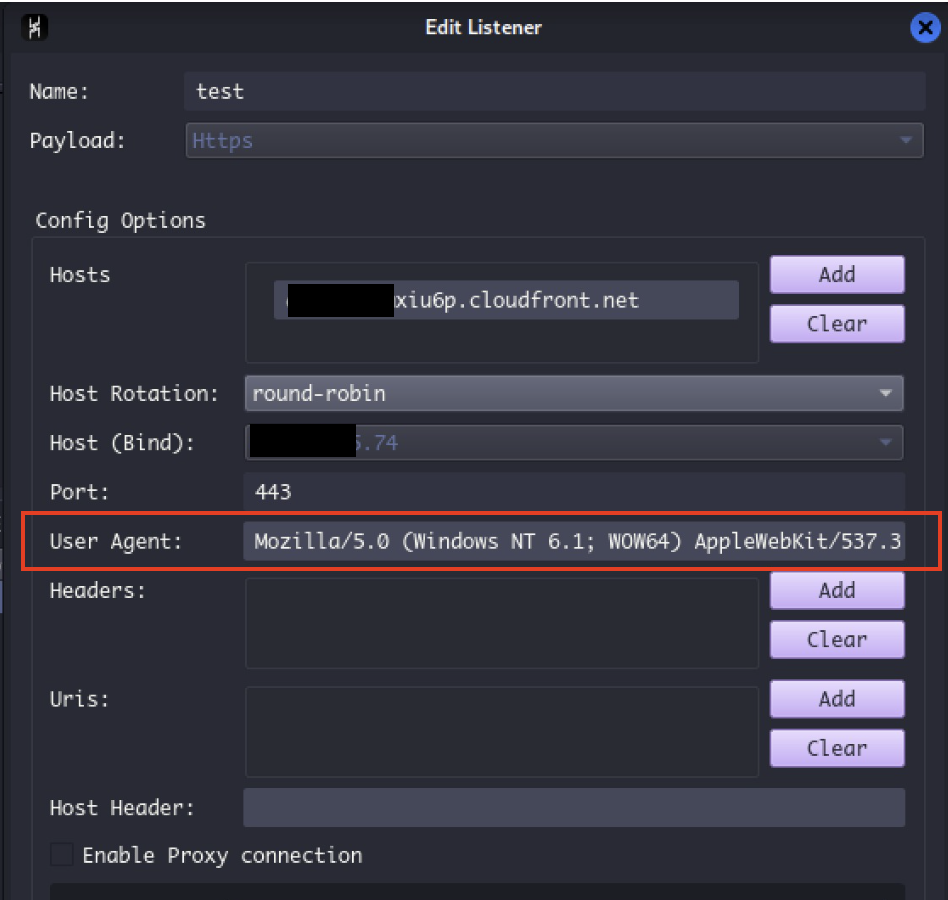Detect a c2 by it’s user agent variations. Part I.
Searching anomalies
There are many ways to detect c2, some very advanced and sophisticated techniques, however the following use case unlike others is simple but quite effective.
The idea is to be able to detect suspicious activities that an EDR/AV proactively by itself or by it’s hunting query could not. -> Think laterally. Look for anomalies.
The use case tries to detect a command & control – c2 by it’s user agent variations.
A c2 will try to simulate a legitimate user agent in some communications, like https. More specifically it’s possible that in the best of cases it will adjust the UA version to the current version of a browser that the victim has installed.

Let’s saying a malware is using the following last ua version: Mozilla/5.0 … Chrome/115.0.0.0 , and the user after some days or a week update automatically multiple times the browser (think just in minor version changes), the UA version of the user will change from Mozilla/5.0 … Chrome/115.1.0.0 to Mozilla/5.0 … Chrome /115.2.0.0 obtaining in that case 3 different versions of the same UA in less than 24h.
Having 2 different version of the same UA in 24h is a normal behavior (browser updates), however getting 3 different version of the same UA in less than 24h is a strange behavior (anomaly).
The rule is created for the Graylog SIEM, however it will be easy to adapt it to another system.
from grapi.grapi import Grapi
import json
import numpy as np
import os.path
from datetime import datetime, timedelta
import os
import logging
#log error message
logging.basicConfig(filename='error_log.log', level=logging.INFO, format='%(asctime)s - %(levelname)s - %(message)s')
#add ua and device to the dic
def add_values(key_device, splitUA, values_ua, fileName):
listDict = []
listUAalert = []
contSameUA = 0
fileName = "ua_anomaly_"+fileName
listSplitUA = splitUA.split("/")
for v in global_dict[key_device]:
if listSplitUA[0] in v: #If it's true seems a previous UA was saved with a different version. It check if the UA from json is the same as the ua saved previous. The difference in that case is that it compare only the name without the version
contSameUA = contSameUA + 1
listUAalert.append(v)
if contSameUA > 1: #just alert for thoese that match more than two previous UA existing
with open(os.path.join('/opt/adv_ua_anomaly/anomalies',fileName), 'a') as file_alert:
file_alert.write("[**]Alert. Devicehostaname ["+key_device+"] use same UA with different version. UA: ["+splitUA+"] ")
for item in listUAalert:
file_alert.write("[%s] " % item)
file_alert.write("\n")
listDict.append(splitUA)
global_dict[key_device].extend(listDict)
#transform the UA: check if is a [Firefox, Edg, Chrome or Version(Safari)].
def transform_data(key_device, values_ua, fileName):
mylist = []
splitValues_ua = values_ua[-35:] #decrease the value len to optimize the loop
if key_device not in global_dict:
global_dict[key_device] = list()
for splitUA in splitValues_ua.split(' '): #iterate all the values from the UA
splitUA = splitUA[:-3]
if 'Firefox' in splitUA and not any(splitUA in val for val in global_dict[key_device]): #check if the UA is Firefox & check if that UA/version was previous saved in the key
add_values(key_device, splitUA, values_ua, fileName)
break
elif 'Edg' in splitUA and not any(splitUA in val for val in global_dict[key_device]):
add_values(key_device, splitUA, values_ua, fileName)
break
elif 'Chrome' in splitUA and not any(splitUA in val for val in global_dict[key_device]):
add_values(key_device, splitUA, values_ua, fileName)
break
elif 'Version' in splitUA and not any(splitUA in val for val in global_dict[key_device]):
add_values(key_device, splitUA, values_ua, fileName)
break
if __name__== "__main__":
global_dict = {}
#make a loop to solve the problem that elasticsearch only return 10k events.
for timeRange in range(2, -1, -1):
#config parameters
lastD = datetime.today() - timedelta(hours=timeRange)
logging.info('***************************************************************')
logging.info('[**] Telemetry from: ' + lastD)
logging.info('***************************************************************')
for minuteRange in range(0, 60, 2):
prevMin = lastD + timedelta(minutes=minuteRange)
nextMin = lastD + timedelta(minutes=minuteRange) + timedelta(minutes=2)
prevMin = prevMin.strftime("%Y-%m-%d %H:%M:%S")
nextMin = nextMin.strftime("%Y-%m-%d %H:%M:%S")
token = ""
url = "http://127.0.0.1:9000/api/search/universal/absolute"
my_api = Grapi(url, token)
my_params = {#removing some UA from the query like Edge/19 and Edge/18 as they give lots of false positive (windows services use them) or urls that returns
"query": "_exists_:eurl AND _exists_:devicehostname AND _exists_:ua AND ua:*Mozilla* AND !ua:*AcrobatServices* AND !ua:*Edge\/18* AND !ua:*Edge\/19*", # Required
"fields": "eurl", # Required
#"range":3600,
"from": prevMin, #"2022-03-22 20:00:00", # Required
"to": nextMin, #"2022-03-21 8:51:00", # Required
"limit": 10000 # Optional: Default limit is 150 in Graylog
}
#read data from the api
response = my_api.send("get", **my_params)
#convert data to json
json_object = json.dumps(response.json())
json_obj = json.loads(json_object)
if "messages" in json_obj:
lastD2 = datetime.today() - timedelta(hours=24)
fileName = lastD2.strftime("%Y_%m_%d")
for i in json_obj['messages']:
#Example: Device-Name[**]Mozilla/5.0 (Windows..) (KHTML, like Gecko) Chrome/99.0.4844.74 Safari/537.36
transform_data(i['message']['devicehostname'], i['message']['ua'], fileName)
else:
logging.error("[!] Error with json recieaved from graylog.")The following advanced rule as well as others are upload on github.